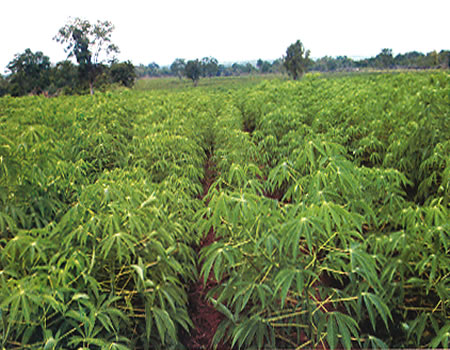WEEDS are major constraints to cassava production in Africa, contributing to yield reduction and placing a huge burden on the lives of farmers, especially women and children.
Because cassava is a long duration crop, women often stoop for hundreds of hours to weed and keep an hectare of cassava clean for a year. In some cases, children are withdrawn from school to help their parents to weed, a practice that compromises the education of children and undermines their future.
However, the gloomy side of weeds in cassava is changing and becoming brighter, thanks to researchers from IITA working under the Cassava Weed Management Project (CWMP) / and the African Cassava Agronomy Initiative (ACAI).
In the last five years, the team has developed an integrated weed control package combining best-bet agronomic practices and the use of environmentally friendly herbicides in a kit known as the Six Steps to Cassava Weed Management.
The package is now being disseminated to help improve the livelihoods of farmers. Furthermore, the team has joined forces with the National Agency for Food and Drug Administration and Control (NAFDAC)—a regulator in Nigeria— and trained 659 spray service providers in communities in Abia, Benue, Ogun, and Oyo state.
The spray service providers comprise young men who already exist in local communities, but are now being empowered on the safe use and application of herbicides.
During the training, which had both practical and theoretical sessions, participants were taught safety and correct use of herbicides, and the use of best-bet agronomic practices in cassava farming systems. There was also a practical session on calibration using knapsack sprayers. A breakdown of trained participants across states showed that Abia had 105 participants, Benue had 101 participants, Ogun had 122 participants, and Oyo had 331 participants.
Through this approach, the researchers are addressing the issue of child labour as well as building local capacities among youth to deal with the problem of weeds.
Moreover, the approach is helping to provide sustainable jobs for young people in local communities. The Assistant Director for NAFDAC in Ogun state, Pharm Linda J. Halim, described the training of spray service providers as a step in the right direction.
She commended IITA-CWMP/ACAI for organising the training, stressing that it would raise farmers’ consciousness on the safe use of herbicides, create jobs, protect and preserve the environment, and improve livelihoods.
Some of the spray service providers who participated in the training described the training as a ‘life-saving event.’
“Most of us spray herbicides without personal protective equipment, and sometimes we use herbicides’ containers for storing water or cooking oil. Through this training, we have discovered that these are wrong practices because empty containers of herbicides contaminate either the water or cooking oil, which affects our health,” farmer Emmanuel Tur said.
“If I go home, I will tell my wife and other members of the community to dispose of empty containers of herbicides properly,” he added.
Another farmer, Rachel Olanipekun said the training demonstrated the must-haves of any spray service provider.
“We have learnt how to protect ourselves, and I thank IITA for training us. This training is an eye-opener for all of us,” she added.
Leader for the Cassava Weed Management project, Alfred Dixon, said the feedback from participants was exciting.
“Through the training, we saw farmers making commitment in terms of behavioral change. This makes me happy,” he said.
Apart from NAFDAC, the trainings were conducted with the support of the National Root Crops Research Institute (NRCRI) Umudike, Federal University of Agriculture Abeokuta (FUNAAB), and the Federal University of Agriculture Makurdi (FUAM) and the Agricultural Development Programs (ADPs).
YOU SHOULD NOT MISS THESE HEADLINES FROM NIGERIAN TRIBUNE
Buy and read digital replicas of your TRIBUNE titles by subscribing through E-VENDING
Clarence Peters Invited For Questioning Over Dancer, Kodak’s Death
Popular video director, Clarence Peters, Tribune Online gathered, has been invited for questioning by the Lagos State Police Command, over the death of dancer, Love Divine, popularly known as Kodak, who was electrocuted in his studio. Kodak, who is a popular dancer within the Nigerian music scene, allegedly died of… Read full story
MONDAY LINES: Death And Dying Emirs
DYING is nothing; choosing the right time to die, if we can, means a whole lot. This coronavirus season is a very wrong time to go – undisturbed. You die now, you leave importunate questions blowing in the air. The Emir of Kaura-Namoda in Zamfara State died on Sunday morning. Was he a victim of COVID-19, the current… Read full story
EDITORIAL: The Kano Mass Deaths
AMID the ongoing efforts to contain the coronavirus pandemic in the country, a strange cloud has enveloped Kano State. In the last three weeks, the state has witnessed massive deaths of people in very controversial circumstances. The deaths first became public knowledge following the release of a video clip… Read full story
JAMB Remits N3.5 Billion To FG For 2020
THE Joint Admissions and Matriculation Board (JAMB) has made an interim remittance of N3.5 billion to the Federal Government consolidated account for 2020. This is in addition to more than N3.5 billion paid to candidates as reduction of cost of ePIN as directed by President Muhammadu Buhari… Read full story
CBN, Bankers’ Committee Suspend Lay-Offs In Banks
A special meeting of the Bankers’ Committee was convened on Saturday, to further review the implications of the COVID-19 pandemic on the Nigerian banking industry a statement from Central Bank of Nigeria (CBN) disclosed on Sunday… Read full story
Court Shuts Church Indefinitely In Abuja Over Lockdown Violation, As Pastor, Others Evade Arrest
A mobile court sitting in Jabi, Federal Capital Territory (FCT), Abuja, on Sunday, ordered for an indefinite closure of The Shekinah Glory Church, located opposite the popular Citec Estate, Jabi, for violating lockdown… Read full story
COVID-19: 50 Almajiris From Kano Brought To Kaduna Tested Positive ― El-Rufai
Governor Nasir El-Rufai of Kaduna State has said that 15 more almajiris that were brought from Kano to Kaduna have tested positive for COVID-19. This was even as he confirmed that the number of almajiris tested… Read full story
Remdesivir: What The NAFDAC DG Said
In a report entitled “COVID-19: We are not likely to use Ebola drug for patients — NAFDAC” published in the Sunday Tribune edition, we quoted the Director-General of National Agency for Food and Drug Administration and Control (NAFDAC), Professor Mojisola Adeyeye, as saying that remdesivir, the drug approved by… Read full story
Abducted Twins Of Oyo Cleric, Akeugbagold, Released After £100,000 Ransom Negotiation
After eight days of dwelling in the bush with their abductors, the twins of former Chairman of the Oyo State Pilgrims Welfare Board (Muslim wing), Taofeek Akeugbagold were released at about 5.30 am on Sunday. The twins were picked near the bush at around Mufutau Laninhun College of Education area on the Lagos-Ibadan… Read full story
Leading With Presence — 2
COVID-19 has changed the world and the way we do things. The changes it has brought upon humanity will be our new norm for some time to come. It is as if it was what the world needed to remind us that the only constant thing about life is change. Social distancing means we make less physical contacts… Read full story
Things That Won’t Change Post COVID-19 (Part 3)
This is the third piece I am penning on this life-changing subject that has started helping a lot of people in Nigeria and beyond. So far, I have written on three non-negotiable values that will not change post COVID-19: vision, loyalty and confidentiality. The fourth value I am writing on is that of assiduousness and… Read full story
Reflections On The Post-Coronavirus International Economic Order
THE novel coronavirus pandemic has been the biggest global economic shock since the 1929 Wall Street Crash. In fact, its ramifications might be even bigger, given that, unlike the 1929 crash, our world is today an integrated global marketplace… Read full story






